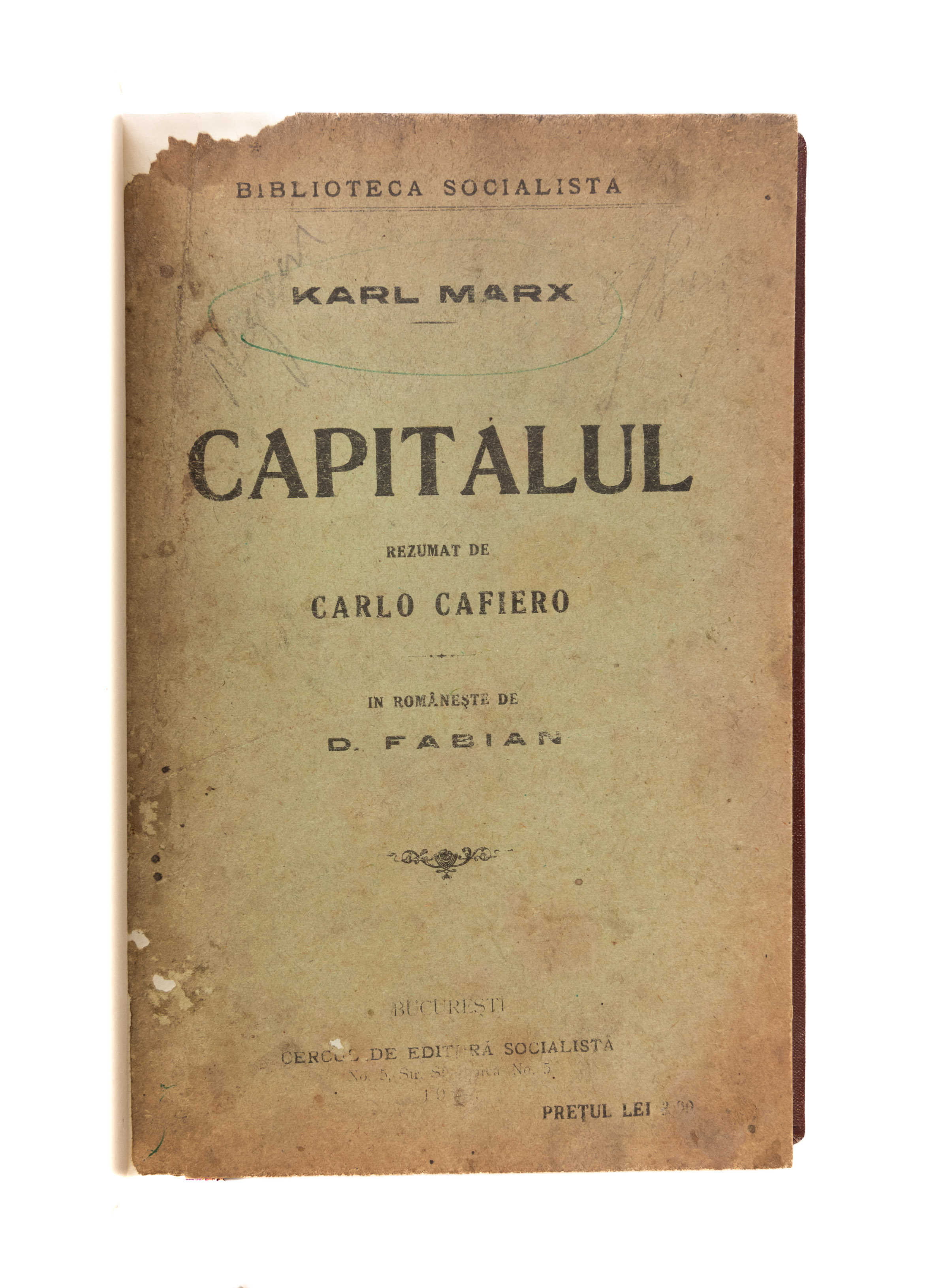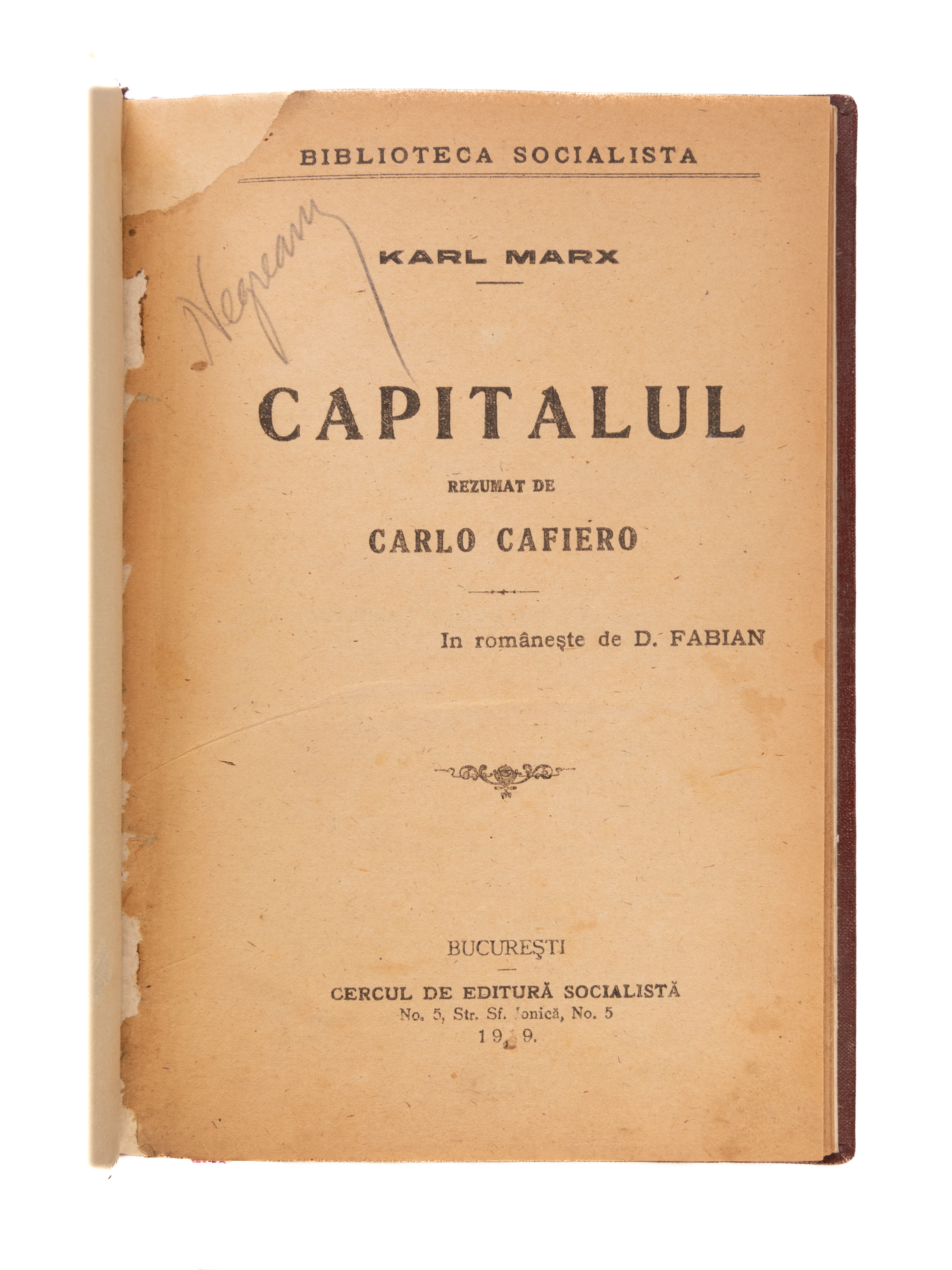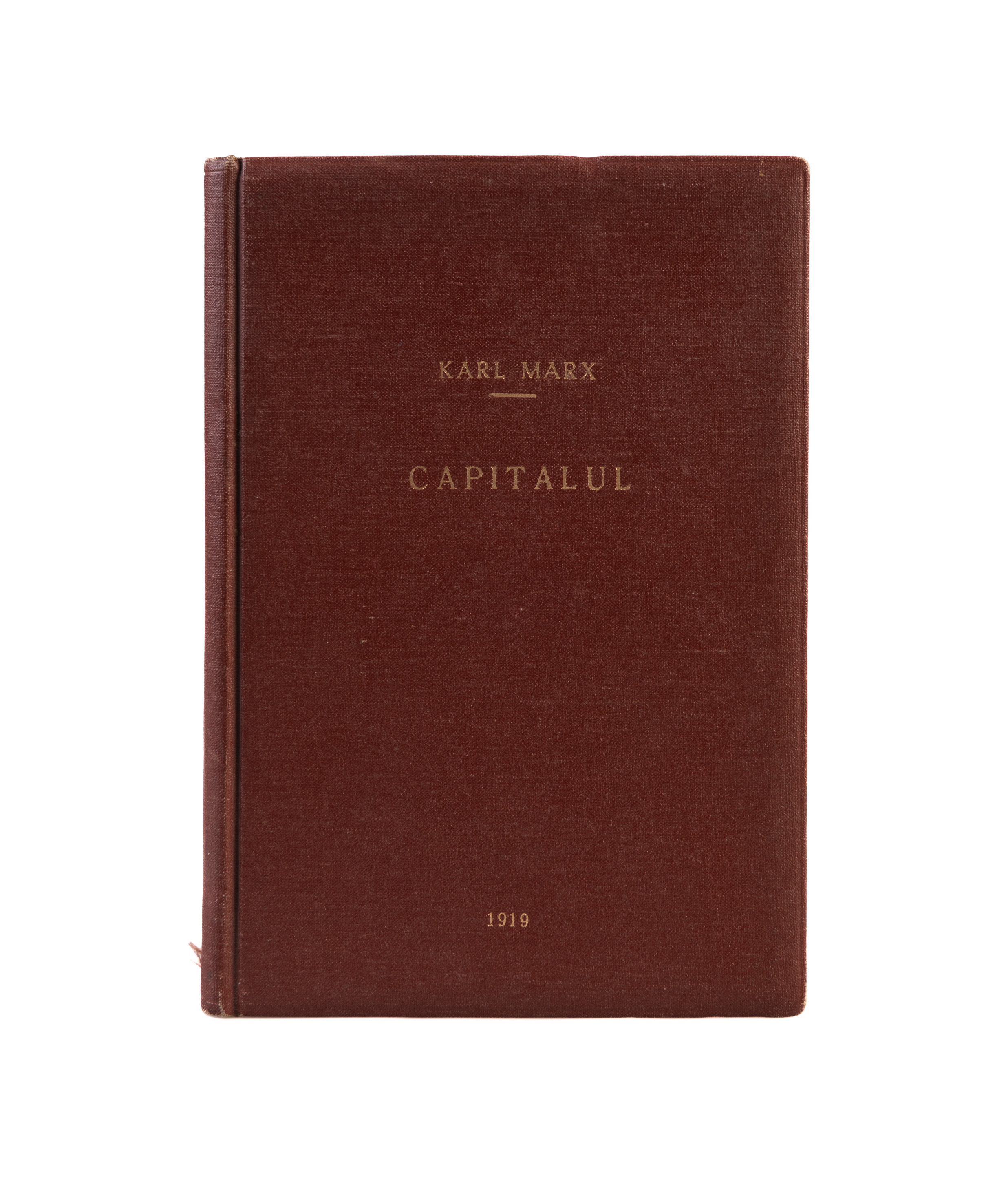Capitalul. Rezumat de Carlo Cafiero.
MARX Karl.; CAFIERO Carlo (1919.)
£1750.00 [First Edition]
Please contact us in advance if you would like to view this book at our Curzon Street shop.
First edition in Romanian. 8vo. 99, [1, blank] pp. Modern brown cloth, front cover lettered in gilt, with the original front and rear printed wrappers bound-in (pencilled ownership inscription 'Negreanu' / 'Negream' to title page, wrappers reinforced with thick paper backing, tiny 3mm hole to title page with loss of one character to the date in imprint, paper repairs to gutter and inside top corner of the title and opening 32 pages, with additional paper repairs to the gutter of the final three leaves). Bucuresti, Cercul de Editura Socialista, Biblioteca Socialita.
The first book-length appearance of Marx's Das Kapital in Romanian, a translation of the hugely influential abridgement of the first volume of Kapital by the Italian socialist Carlo Cafiero, originally published in Italian in 1879 - one of the earliest and most important of such abridgements, and much admired by Marx himself.
The development of Marxism in Romania prior to the First World War was slow to say the least and early Romanian "socialist organisations were far from homogeneous", with Marxism being "only one of many 'socialisms' that competed for the adherence of the socialist circles". Indeed, "there were few among them with a knowledge of socialist theory and still fewer who were acquainted with Marx’s writings" (Hitchins, p. 374).
"The first systematic attempt in Romania to explain the contents of Das Kapital" (Hitchins, p. 376) was made in the year of Marx's death in 1883 by the influential Romanian socialist politician and writer Anton Bacalbasa (1865-1899). It consisted of a three-part partial abridgement drawn from the first three sections of Das Kapital and published in the socialist periodical Emanciparea. The article, titled 'Capital', amounted to eight pages in total, with Bacalbasa freely adding his own explanatory notes and adapting the various examples used by Marx for the benefit of the Romanian reader.
Although the first nationwide Romanian socialist party was founded in 1893, the majority of its membership quickly concluded that the underdeveloped socio-economic conditions of Romania meant that "the prospects for the achievement of socialism in the foreseeable future were nil" and many of its members merged with the National Library Party in 1900 (Hitchins, p. 379). It would not be until after the First World War, under the impact of the 1917 October Russian Revolution, that Marxism would come to the fore in Romania.
However, the first full Romanian translation of the first volume of Kapital would still not appear until after the Second World War in the form of an official publication of the Romanian Communist Party in 1947, the same year as the forced abdication of King Michael I and the subsequent formation of the People's Republic of Romania.
The present translation of the Cafiero abridgement therefore represented the first book-length appearance of Kapital in Romanian. The translation was undertaken by David Finkelstein (1895-1937), usually referred to by his pseudonym David Fabian as with the present publication which is signed 'D. Fabian' – the Jewish 'Finkelstein' presumably being dropped on account of rampant antisemitism in Romania before and after the First World War. The translation was based on James Guillaume's French edition published in Paris in 1910 and is accompanied by a short two-page preface by Fabian.
David Finkelstein Fabian's life and political career is highly emblematic of the trajectory of Romanian communism in the aftermath of the 1917 October Russian Revolution. Fabian was active in underground Bolshevik circles in Bucharest from 1918 and was a founding member of the short-lived Socialist Party of Romania (Partidul Socialist din România) on December 11, 1918. Only three days later, Fabian would be involved in the events surrounding the notorious 1918 Romanian typographers' strike that culminated in a mass rally on December 13 where army regiments were ordered to fire upon the protestors.
The fallout was equally extreme, with the majority of the leading members of the newly-founded Socialist Party being rounded up and imprisoned. Fabian was able to flee the country, emigrating first to Italy and then France, and was present in Moscow in 1920 at the 2nd World Congress of the Comintern (the Third Communist International) as part of the delegation sent by the majority Bolshevik faction of the Socialist Party of Romania.
The delegation's pledge to join the Comintern caused a split in the Socialist Party of Romania, resulting in the formation of the Romanian Communist Party (Partidul Comunist Român, PCR), of which Fabian was a founding-member and served on the Central Committee from 1922. The foundation of the PCR and its incorporation into the Comintern directly brought about the notorious era relentless state-sponsored repression of communism in the Kingdom of Romania from 1921 up until 1944, spurred on by fears that the Romanian monarchy would fall to an uprising akin to the Bolshevik revolution. The consequences were immediate and on the final day of the PCR's first Congress 271 members were arrested and tried for treason in what is known as the Dealul Spirii Trial.
The suppression of communism in Romania during this period brought about a structural division in the organisation of the PCR between 'internal' and 'external' factions, that is, a clandestine secretariat inside the country and a politburo in exile abroad. Fabian was a member of this 'Political Bureau Abroad' from 1924, establishing his headquarters in Vienna. "During this period, he served on successive central committees, and in 1926, he laid the foundations for the party's ideological apparatus as the editor in chief of a series of the RCP's theoretical and political monthly Lupta de clasa" (Tismaneanu, p. 62f).
However, Fabian fell foul of a change of leadership in the PCR and was purged from the party in 1928 for having "expressed his concern about the party's future in a letter to the Comintern's Balkan Federation, advocating the establishment of its head quarters inside Romania" (Tismaneanu, p. 63). Unable to return to Romania due to the very real possibility of imprisonment, Fabian emigrated to the Russia "where there was already a strong (albeit not very numerous) group of Romanian political émigrés in Moscow and other cities. He tried to convince the RCP's new general secretary that he could contribute to the party's ideological life, but the new leadership turned down the offer and treated Fabian as a political outcast" (Tismaneanu, p. 63).
Fabian would eventually secure membership of the Communist Party of the Soviet Union (CPSU) but "there was little else to do in Russia but ideological work" and he was primarily engaged in translating Lenin's collected works into Romanian. "One of Fabian's last translations was of Stalin's speech to the CPSU's March 1937 central committee plenum. This was at the height of Stalin's Great Terror: a time of universal fear and suspicion. Like so many of his friends, Fabian found himself trapped in the Kafkaesque universe of the so-called Yezhovshchina — the terrifying period between 1937-39 when Nikolay Yezhov headed the NKVD and no one was safe" (Tismaneanu, p. 64).
Fabian was arrested and executed at the age of forty-two in December 1937, along with the vast majority of the 'exterior' faction of the Romanian Communist Party, amounting to an entire generation of party activists killed on Stalin's orders.
Although Fabian would later be judicially rehabilitated in the Soviet Union, it is notable that the bibliography of the works of Marx and Engels in Romanian, an official publication of the Romanian Communist Party printed in 1956, makes little to no reference to Fabian.
Rare. No doubt owing to the widespread repression of communism in Romania from 1921 to 1944. No copies on OCLC.
See: Keith Hitchins, 'Rumania', in: The Formation of Labour Movements 1870-1914: An International Perspective, Vol. 1; Vladimir Tismaneanu, Stalinism for All Seasons: A Political History of Romanian Communism.
Marx Si Engels Limba Romina 1871-1994, p. 30.
Stock Code: 243597






